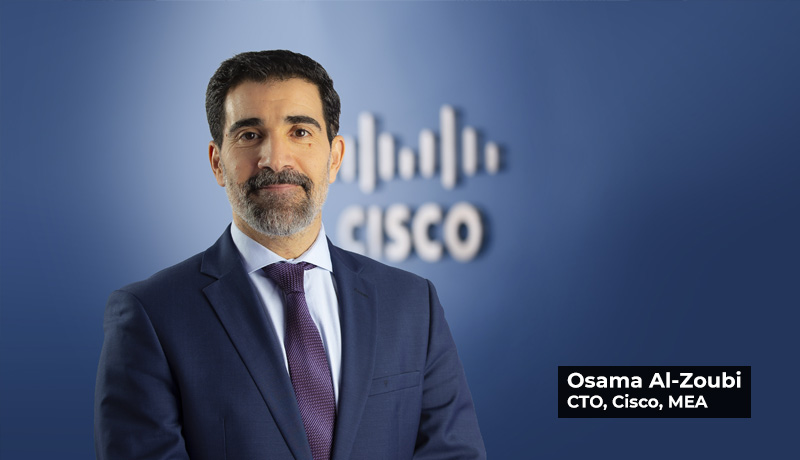
Cisco has unveiled the technology trends that are predicted to have a significant influence in 2022 and beyond with the commencement of the New Year.
Commenting on the trends and predictions, Osama Al-Zoubi, CTO, Cisco Middle East and Africa, said “Technology is always evolving and moving in exciting new directions. In a time of fast-paced digitization, we identified a range of trends and innovations our customers can expect to see over the next years.”
Prediction: If we are truly interested in an inclusive future for all, ethical, responsible, and explainable AI – from design and development to deployment – will become a key priority for companies and governments around the world.
The massive amount of data being generated has already outstripped human capacity, but it must still be processed “intelligently” and, in some situations, in near real-time.
Machine learning (ML) and artificial intelligence (AI) will come into their own in this environment. The problem is that data raises concerns of ownership, sovereignty, privacy, and compliance. And if the AI utilised to generate immediate insights has built-in biases, then these insights are faulty from the start.
As a result, ethical, accountable, and explainable AI is required. The AI must be transparent, so that everyone who uses it understands how the insights were generated. All components of the AI lifecycle — design, development, and deployment – must be transparent.
Prediction: The Edge will be propelled into entirely new application development and experience paradigms as a result of the data deluge, data gravity, and the requirement for predictive insights.
The business apps that modern businesses create, connect to, and use define them. In fact, applications will become the enterprise’s boundaries, whether they serve end-users, business-to-business links, or even machine-to-machine connections.
.The business interactions that occur across many types of applications will result in an ever-increasing data flood. Every encounter will create new data that can be used to anticipate outcomes. For some use scenarios, data will most likely gravitate to a central data storage as a result of predictive insights. Other use cases, such as machine learning and other capabilities, will necessitate pre-processing of some data at the Edge.
Prediction: In an application-driven world, unleashing the power of data is critical to the future of innovation and business.
Teams will be able to better automate numerous complicated actions, eventually leading to automated self-healing, in addition to generating contextual business insights from data. To achieve this future state, apps must be built with an automated, observable, and API-first attitude, with seamless security built in from development to run-time. Regardless of provider or source, organisations will be able to identify, inspect, and manage APIs.
Prediction: The metaverse will only be realised and access to technology and innovation will become ubiquitous if predictive and seamless Internet connection is provided.
The trend toward unfettered connectivity and communications will undoubtedly continue. Everyone, whether nomadic or mobile, can see how convenient it is to use electronics wirelessly.
This always-on internet connectivity will assist to reduce social and economic disparities by providing more equitable access to the modern economy, particularly in non-metropolitan areas, and so creating jobs for all. However, this does not mean that operations must come to a halt if wireless access is lost or interrupted. Internet access that is widespread, stable, and always on at reasonable prices is required in the future. A future with seamless internet services necessitates heterogeneity of access, which means AI-augmented and seamless connectivity across all cellular and Wi-Fi generations, as well as future LEO satellite constellations and beyond.
Quantum computing, communications, and security will power a speedier, more secure future, according to predictions.
Quantum computing and security will interact in a very different way than traditional communications networks, which use bits and bytes to transmit voice and data. Quantum technology is based on unexplained phenomena in quantum physics known as entanglement, which allows particles to share states. This phenomena can be exploited to share or transfer information in quantum networking. The idea of combining multiple smaller quantum computers to create a massive quantum computer is appealing.
.Quantum networking has the potential to provide a new sort of secure link between digital devices that is impenetrable to hackers. Quantum networking may make it possible to provide foolproof security, which could lead to improved fraud protection for transactions. Furthermore, this greater level of secure connectivity may be able to safeguard voice and data communications from surveillance or interference. All of these ideas would fundamentally alter the internet as we know it now.